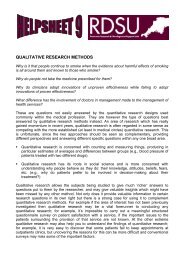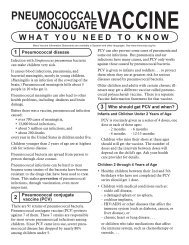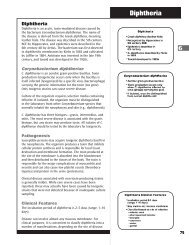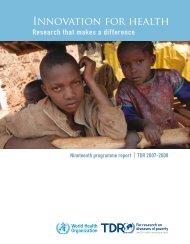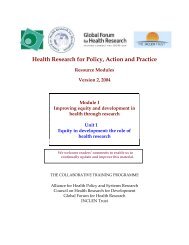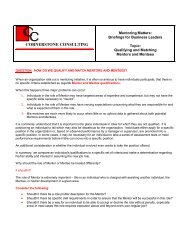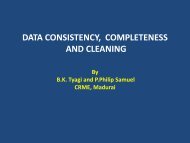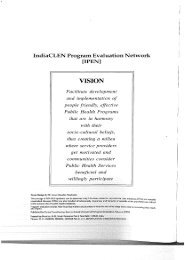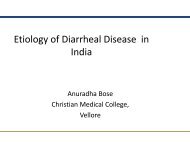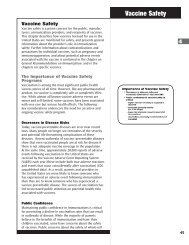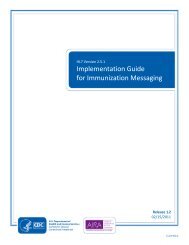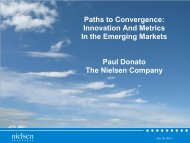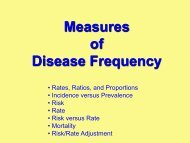Measles, Mumps, and Rubella - Centers for Disease Control and ...
Measles, Mumps, and Rubella - Centers for Disease Control and ...
Measles, Mumps, and Rubella - Centers for Disease Control and ...
Create successful ePaper yourself
Turn your PDF publications into a flip-book with our unique Google optimized e-Paper software.
Vol. 47 / No. RR-8 MMWR 194% among nursing assistants, <strong>and</strong> 4% among medical <strong>and</strong> nursing students (115 )(CDC, unpublished data). A general decline in measles incidence occurred after 1991.However, 15 of the 75 measles outbreaks reported during 1993–1996 involved transmissionin a medical facility, <strong>and</strong> a total of 36 measles cases (1.8% of all reportedcases) occurred among persons working in health-care facilities (CDC, unpublisheddata). Although similar surveillance data are not available <strong>for</strong> rubella, outbreaks haveoccurred in health-care settings, <strong>and</strong> health-care workers have transmitted rubella topatients (116 ) (CDC, unpublished data).All persons who work in health-care facilities should be immune to measles <strong>and</strong>rubella (Table 1). Because any health-care worker (i.e., medical or nonmedical, paid orvolunteer, full- or part-time, student or nonstudent, with or without patient-care responsibilities)who is not immune to measles <strong>and</strong> rubella can contract <strong>and</strong> transmitthese diseases, all health-care facilities (i.e., inpatient <strong>and</strong> outpatient, private <strong>and</strong> public)should ensure that those who work in their facilities are immune to measles <strong>and</strong>rubella (Table 1)*.Health-care workers have a responsibility to avoid transmitting these diseases <strong>and</strong>thereby causing harm to patients. Adequate vaccination <strong>for</strong> health-care workers bornduring or after 1957 consists of two doses of a live measles-containing vaccine <strong>and</strong> atleast one dose of a live rubella-containing vaccine (Table 1). Health-care workers whoneed a second dose of measles-containing vaccine should be revaccinated 1 month(at least 28 days) after their first dose.Although birth be<strong>for</strong>e 1957 is generally considered acceptable evidence of measles<strong>and</strong> rubella immunity (Table 1), health-care facilities should consider recommending adose of MMR vaccine to unvaccinated workers born be<strong>for</strong>e 1957 who do not have ahistory of physician-diagnosed measles or laboratory evidence of measles immunityAND laboratory evidence of rubella immunity.<strong>Rubella</strong> vaccination or laboratory evidence of rubella immunity is particularly important<strong>for</strong> female health-care workers who could become pregnant, including thoseborn be<strong>for</strong>e 1957. In addition, during rubella outbreaks, health-care facilities shouldstrongly consider recommending a dose of MMR vaccine to unvaccinated health-careworkers born be<strong>for</strong>e 1957 who do not have serologic evidence of immunity. Serologicsurveys of hospital workers indicate that 5%–9% of those born be<strong>for</strong>e 1957 do nothave detectable measles antibody (117,118 ) <strong>and</strong> about 6% do not have detectablerubella antibody (119 ). In addition, during 1985–1992, 643 measles cases were reportedamong health-care workers whose year of birth was known; 27% of thesepersons were born be<strong>for</strong>e 1957 (CDC, unpublished data). Comparable surveillancedata are not available <strong>for</strong> rubella.Serologic screening need not be done be<strong>for</strong>e vaccinating <strong>for</strong> measles <strong>and</strong> rubellaunless the medical facility considers it cost-effective (91,120,121 ). Serologic testing isappropriate only if persons who are identified as susceptible are subsequently vaccinatedin a timely manner. Serologic screening ordinarily is not necessary <strong>for</strong> personswho have documentation of appropriate vaccination or other acceptable evidence ofimmunity (Table 1). During outbreaks of measles or rubella, serologic screeningbe<strong>for</strong>e vaccination is not generally recommended because rapid vaccination is necessaryto halt disease transmission.*Facilities that provide care exclusively <strong>for</strong> elderly patients who are at minimal risk <strong>for</strong> measles<strong>and</strong> rubella <strong>and</strong> complications of these diseases are a possible exception.



